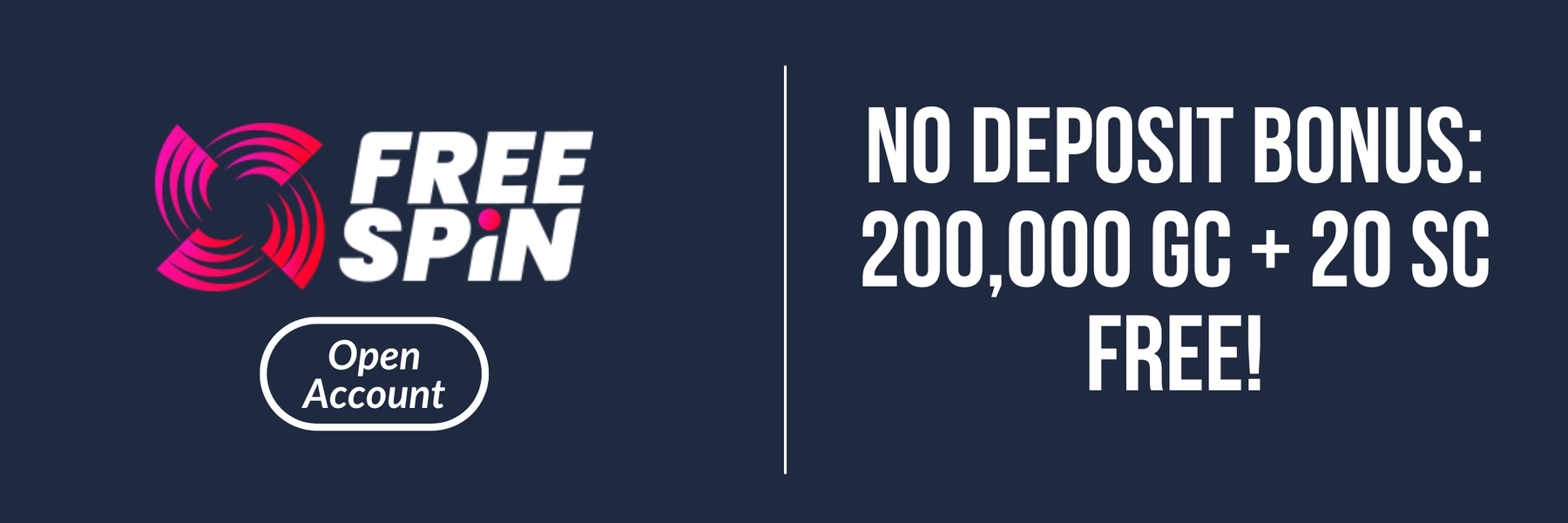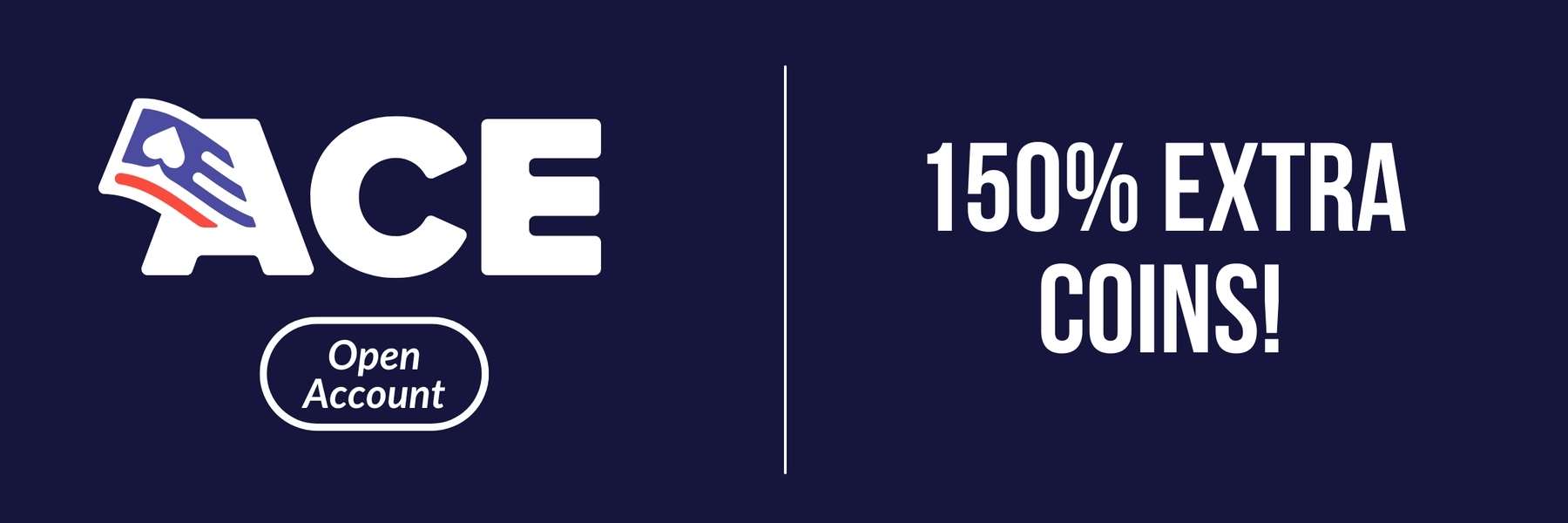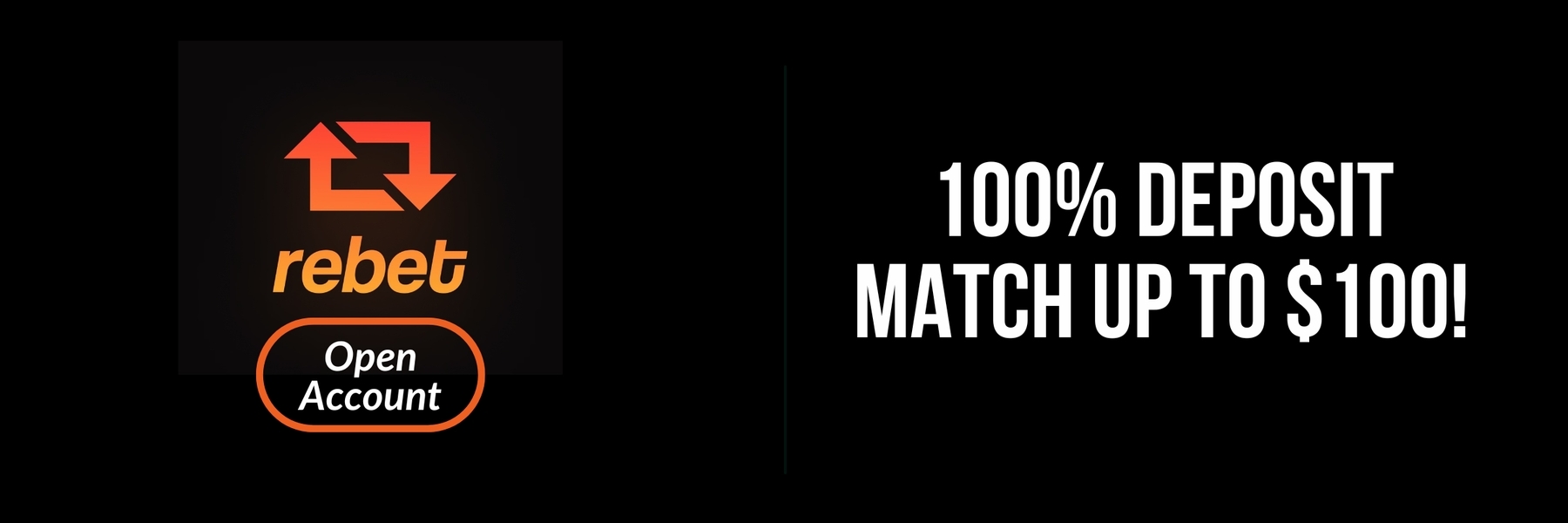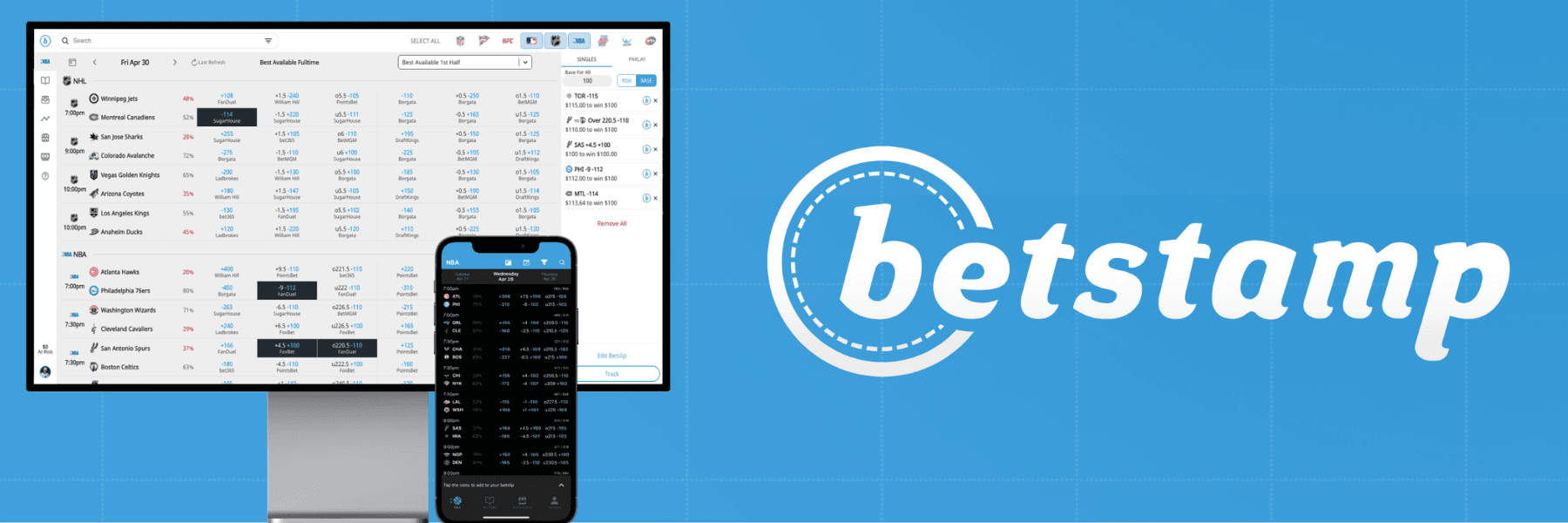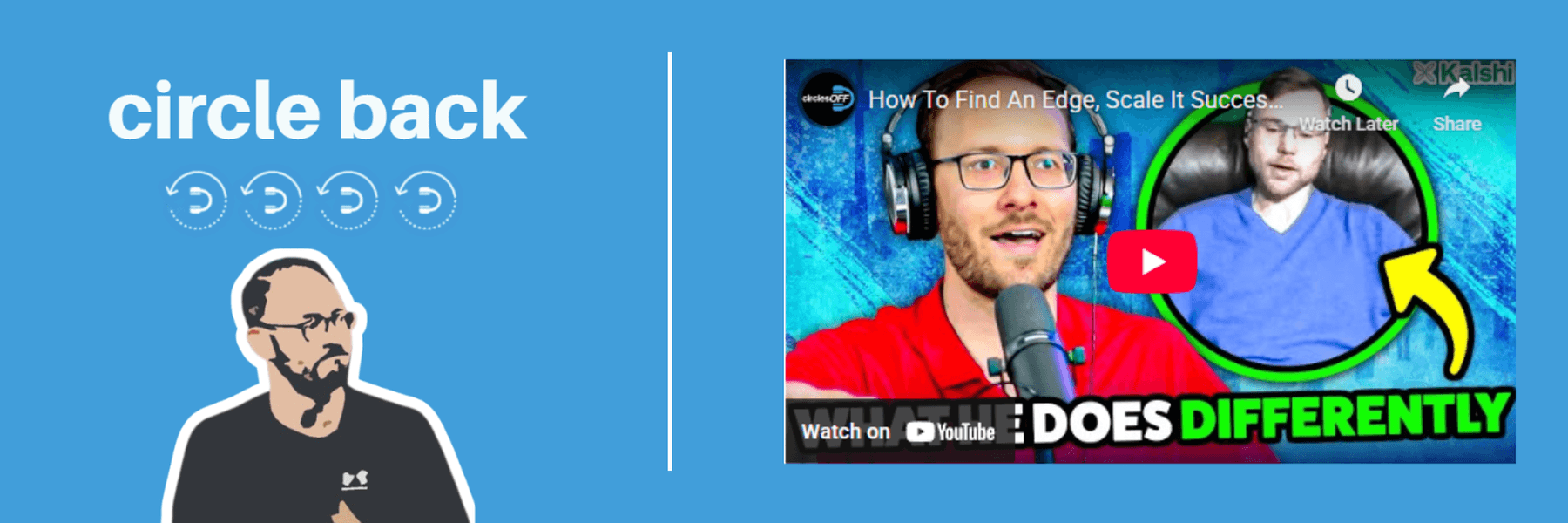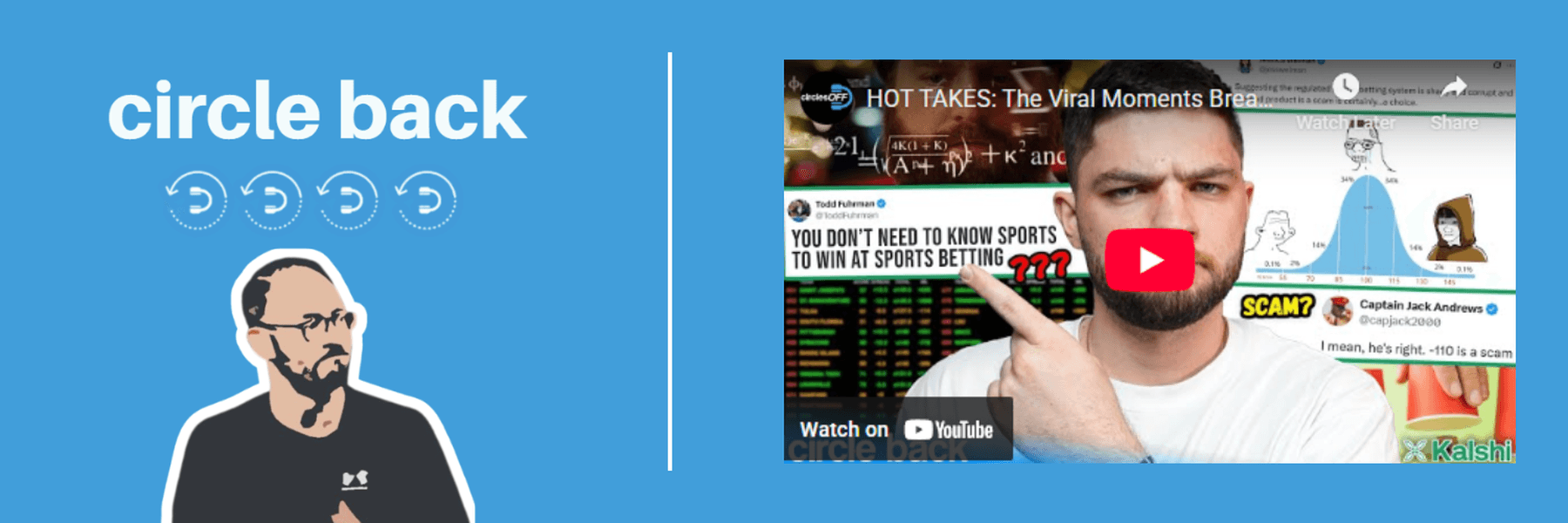00:00 - Rob Pizzola (Host)
On this week's episode of Circles Off, we're joined by Eric Eager of Sumer Sports. Now, eric's been on Circles Off before, but this one's going to be a little bit different. We're going to take the first half of the season, we're going to review it a little bit, why certain things are happening, and we're generally just going to discuss football analytics in the space, how they should be used in the NFL and in betting. A lot to cover. This week's Circles Off starts now Come. This week's Circles Off starts now Come. On, let's go. Welcome to Circles Off, episode number 126. Right here on the Circles Off YouTube channel, the Hammer Betting Network and powered by Pinnacle Sportsbook, rob Pizzola, joined by Johnny from Betstamp. How's it going? Quiet today. Quiet over here today.
00:46 - Zack Phillips (Other)
Number 26, anything, no, nothing. Do you know any 26? Any 26 is zach, uh, no, not off the top of my head. Actually that's a good I. I didn't come prepared with. The 26 is 27. Uh, for next week is pretty easy, but because there's one leaves guy that I just think about immediately yeah, 27 is simple.
01:01 - Rob Pizzola (Host)
Think of 26 26, the only like modern day nfl-er that has a that I can think of. I don't want to say that has a tangible impact, because a lot do. But saquon barkley, where's 26? Right, but back in the day, martin saint louis oh yeah, 26. Have you ever seen martin st louise quads? Yeah, it's nuts, it I? I don't know what, what he could press back in the day or what he could squat like we all see, like the nick chubb squats that were like 600 pounds, jalen hurts or whatever bartend st louise quads were, are actually disgusting, like like you. You look at them and you're like like it's actually gross he's so compact, right like he's a small little little guy and you just wouldn't expect it.
01:56
The guys like that I've had to read they have to get like all custom-made pants, because they literally can't pull their pants up yeah, their knees.
02:03 - Zack Phillips (Other)
Well, I mean, I'm not like I obviously didn't have it to the same extent, but like playing hockey for a long time and at a higher level, you get the hockey butt right. And then I had a problem for a long time with pants and it was just because, like your butt and your legs get bigger your legs already get strong yeah.
02:20 - Eric Eager (Guest)
And that was what it was.
02:21 - Zack Phillips (Other)
And it had nothing to do with like being really jacked or anything. It's just you're in that skating position five, six times a week. Naturally, it starts to do that.
02:29 - Rob Pizzola (Host)
Well, you're using those muscles for sure, yeah, but yeah, I like St Louis not getting that lower body from just skating.
02:35 - Eric Eager (Guest)
I'll tell you that, no, no, that guy was hitting the gym hard.
02:45 - Rob Pizzola (Host)
Sidney Crosby was also known for always having like really large legs. Yeah, I don't want to share like specifics of a story once, but I do know of a story where Crosby specifically asks someone to like not get his legs in a picture because he was uncomfortable like having his legs shown in a picture.
03:01 - Zack Phillips (Other)
I would legitimately have my legs in every photo ever, if my legs look like that to each their own listen I'm a little skinny guy, I'm not squatting a ton or whatever.
03:11 - Rob Pizzola (Host)
I you know. People might be surprised to know that I do exercise and work out, but I'm like like I'm not ever in my life aiming for uh, for legs like that a little bit gross.
03:22 - Zack Phillips (Other)
I don't know man, I don't know. To each their own.
03:25 - Rob Pizzola (Host)
Like I said, now, to each their own with sportsbook selection, but number one in the land is pinnacle sportsbook. Might bet a bunch of different spots, in fact I'd encourage you to do that, but make sure pinnacle sportsbook is one of those spots. Everyday, competitive odds, bet, smart Bet Pinnacle, your trusted sportsbook for the past 25 years. Use code HAMMER when signing up, as it does help support myself. Zach Johnny over here on the show. We can maybe upgrade his clothes next week. Get him some sunglasses, that juice box hat he's been wearing that for a while. You must be 19 plus Av, available in ontario, not available in the us, and please play responsibly. In all seriousness, if you're listening, you have no idea what's going on, so I'll just fill you in here. I got a mannequin on my right over here. Um with johnny over the course next couple months can be very hit or miss. Can Can be here sometimes. He won't be here Some other times. Still very much committed to bring you the best content possible. Huron circles off, but just so it's not awkward and people are like, oh, what's going on? It's really nothing. Just don't really want to share it, but he's going to be in and out. That's going to be the case over the course of the next couple of months. But as we are committed to producing the best content, we got one of the best football analytics guys, if not the best in the entire land.
04:51
Our guest on this week's Circles Off is someone that you've probably seen before if you follow the Hammer Betting Network. Does some content for us on the Forward Progress YouTube channel as well. Previously, an episode on Circles Off, episode number 31. That was a long time ago, was audio only, so it's the first time you're seeing him video here on this channel. It's dr eric eager. You can follow him on twitter at eric eager underscore. Make sure you put that underscore at the end. The vp of sumer sports, formerly of pff. We're going to get into a wide range of NFL discussion today, eric. How goes it?
05:29 - Eric Eager (Guest)
Rob, it's like I saw you last night at the Monday night game. It's been a fun season. I don't think the gameplay has been great, but it's been fun just kind of hanging out with you and the folks at the Hammer, as well as a privilege to be on the show for the second time.
05:46 - Rob Pizzola (Host)
All right. Well, let's get right into it and we are going to talk a lot of NFL. We're kind of at the midway point now. I want to get your thoughts on a ton of things related to NFL as much as possible, but we last had you on in November of 2021. It's been a long time. At the time, you were the VP of Research and Development for Pro Football Focus. Now you're the VP of Sumer Sports. Just for the people that don't know what brought about, the change for you.
06:11 - Eric Eager (Guest)
It was a very kind of weird time for me, just because PFF was going through a transition. I know a lot of people have seen. You know they got, you know, venture capital money from a company called Silver Lake, they kind of. You know, prior to that it was like a dream job for somebody like me who just wanted to analyze football, you know, build products for teams, interact with teams, just kind of kind of like a jack of all trades, and then, like as the as you know, when these things happen, like when you know folks buy into your company, they kind of like obviously take it into a different direction. And it wasn't like I, I hated the direction that PFF was going. It was more that, you know, I was somebody who liked to do a little bit of everything. I liked, you know, doing content, obviously, and and I liked, you know, I liked, working with teams and I like kind of doing a little bit of everything, and that was just not going to be a reality anymore. And so, you know, I, I, I tried, you know, I tried really hard to kind of stay the course.
07:14
And then, you know, last summer there was a lot of opportunities, I, you know, right around when Thomas Dimitrov got fired from the Falcons, that was somebody who I like helped a lot when I was at PFF with various projects, and so when, when he got fired, I like kind of built a friendship with him, kind of like, hey, if PFF is going to build a really good tool for general managers and not just analytics people in the league and not just coaches in the league, what was this going to look like? And so we kind of daydreamed over like what, what a product would be. And then, sort of last summer, it was kind of one of those where it was like I was on the fence about staying at PFF and Thomas, you know, is the CEO at our company and you know enough things happened where it kind of made sense for me to move on. And then you know it was also, you know, fun, because it was also, you know, the hammer was starting then and so there was an opportunity for me to do some stuff with you guys, and so it just made a lot of sense.
08:09
I have really no. You know, pff was a very special place for a number of years and I don't necessarily know if it's the same, but it's something that I look back on fondly. But had to kind of end for me.
08:25 - Rob Pizzola (Host)
Okay, so walk us through your role now at Sumer, and particularly what the business model is for Sumer Sports as a whole. I see a lot of the content that you guys are producing regularly with your brand as well. It's very interesting. The show with you and Thomas is actually great. I would highly recommend that for anyone that's out there. But what exactly does Sumer Sports do? You guys are an analytics company, but it's much more than that, so describe it to the audience.
08:46 - Eric Eager (Guest)
Yeah, yeah, and thank you for that. I mean it's a very different flavor for one, like just on the podcast side, like I'm more the host than the analyst to an extent and we kind of let Thomas talk. We don't really talk about gambling on that show because of Thomas's background, and so it's much different than the PFF forecast, which was my podcast with George at PFF. So we've kind of, you know, we have two kind of sides to the company, kind of like a lot of companies where we're building, you know, tools for NFL teams to use their own IP and kind of leverage it. So PFF would always come in and be like hey, here's a bunch of data we collected, here's a bunch of algorithms we've built on that data and it was kind of a one-size-fits-all and it was very innovative and it allowed teams to become more efficient and things like that. But what we're trying to do is say, hey, we're not going to tell you how good your players are. We want you to come and tell us what you think of your players and then we'll try to take those raw materials and build things like value and trades and you know tools to use this, you know, to build out. You know, for example, today in the trade deadline, what was the Montez Sweat trade worth? What is it a surplus to both teams given their states of play, or did one team get fleeced? Et cetera.
10:00
Those and having it be kind of agnostic of our own opinions and more kind of the opinions of the team that's kind of the B2B side is building kind of bespoke tools for teams using their own IP and then on the on the B2C side, which is, you know, the podcast and the website, and eventually we're going to come out, hopefully in the next week or so, with with a fantasy kind of like large language model thing where you can kind of type in you know what is, what is Michael Mayer's like projected yardage in this game and go and use that for however you want to.
10:33
That's kind of more of a forward facing tool where again, we don't necessarily want to be in the hot take business, we just kind of want to be in the what is business and and go a little bit further. I one of the things I was always disappointed with at PFF was I thought the consumer product was the best in market for a long time. But if you look at kind of like most websites over the course of four or five years. How many new metrics are they're adding? We want to be kind of that group that's adding new things like all the time, so that folks like you who are trying to find an edge betting or just want to talk about the league more intelligently, there's like a new thing to talk about like every so often, which I think is kind of missing in the space.
11:11 - Rob Pizzola (Host)
Very interesting. So in terms of, like, the addition of new things, maybe not from a pure product perspective, but what would you say are, like, some of the key trends or advancements in football analytics that your company's currently working on or monitoring closely. And I understand this is like you know, it's prying a little bit. There's it's a competitive market, so you don't have to give away all the bells and whistles, but what's, what's some of the advancements that you guys see coming down the road here?
11:37 - Eric Eager (Guest)
I think there are a few ones for me. Using publicly available data, you can make a lot of advancements in modeling coaching, which I think that I tried to do at PFF. We kind of never really made it into a product because it was kind of like a fun little topic, but like really trying to formalize that and build tools so that either NFL teams who are trying to hire coaches can use them or the consumer who's trying to understand, like why is my team, you know, why is my team looking good in a bunch of different metrics but not winning right? Oh, it's because you know they're giving up 0.3 win probability points per season in terms of, you know, fourth down decisions, stuff like that. So that's one that I don't think a lot of people are really into. That, I think, has a real significant edge. The other one is you know the behind the scenes for me and this is kind of using tracking data, but it's also just using kind of hardworn, you know IP that I've generated from just like being embedded into teams at times is development and how development factors into how you allocate your resources. So you know we think about the Montez Sweat thing right Like he gets traded today to the Chicago Bears.
12:52
The Bears are in a situation where they have more cap space and draft capital than they really know what to do with and like, does it make sense to sign kind of a young but not rookie deal edge player and pay him a lot of money? Is that a good use of your capital and are you going to be able to develop that player better than a first round draft pick with all the variants associated with it? Should you ever draft a safety or should you just go into free agency and acquire a guy for seven million every single time? Like there are tons of like low hanging fruit questions that I think were pretty good. Like the average, I think, football fan who's pretty sharp, that kind of gets it. But kind of putting that all into formal, like formal logic and model based stuff to me is a really enticing and challenging and fun thing to work on every day side of things, in particular with sumer working directly with some nfl teams.
13:48 - Rob Pizzola (Host)
Is there a particular like success story or some sort of case study where sumer sports analytics in some way had a significant impact on a football team's performance or strategy? And obviously I'm not asking you to name the team or anything like that, but if we could get into some sort of specifics of how you would directly help a team, that might really give people a glimpse into what goes on on a daily basis yeah, I mean, I could give out some.
14:11 - Eric Eager (Guest)
I can give out some like actual examples at pff because, like the time, the time horizon has gone away. Like you know, in 2018, um, you know, this team was coming off of a divisional round matchup. You know, know, super Bowl two years ago. They were not going to be able to retain a guard and a wide receiver at veteran money. So they came to us and said, hey, given our scheme, who is the most optimal player in the draft at this position? Who's the most optimal player in free agency at that position? And we gave them Calvin Ridley and Brandon Fusco, who they ended up signing and drafting. Ridley, by the way, you know, just fit their offense better than DJ Moore did, and DJ Moore went slightly before.
14:52
But that was like, and we built an entire product off that, basically, where you could go in and toggle through, like you know, scheme related stuff. So, how often do you run inside zone? How often do you run inside zone? How often do you run outside zone? And like running backs and guards? For example, brandon Fusco was a below league average guard if you took his average data, but if you just ran outside zone or ran outside zone at a pretty high clip. He was actually above league average and so, being able, we did that very, in a very bespoke way at first and then we codified it so that every team that bought the upsell of PFF's product could use that. That was like kind of the start of a lot of the cool ideas.
15:30
You know, just a team asking a really good question and you know, knowing that the data is probably rich enough to answer it, just like trusting us to have that answer. I think most recently, you know, at Sumer, we just have teams, for example, that are on their bye week, that are just reaching out to us and being like, look, our red zone efficiency is awful. Like what kind of plays? Uh, can we, can we like what do we need to start doing? Um, and that's a really interesting question.
15:54
Or, you know, even even to you know and this is kind of I'm not going to say the names, but like even to the point of like hey, you know, we're like I've got a number of calls that basically like, hey, we're going to make a trade with this team other than these two players, which ones do you want? And like they go with it a lot more than I, you know that you would expect you know from somebody who's not in the building and doesn't have some of the information, medically, for example, that they have. So just stuff like that, where it's like it's been really interesting to look at the evolution of teams and the decisions that they make and like where they think they're weak, for example, um, and and that's really where they're coming to ask you some questions so that was a very uh, interesting answer and there's a lot I want to unpack there.
16:40 - Rob Pizzola (Host)
You talk about the red zone efficiency. We're going to get to like modern day nfl here shortly and go through like the first half of the season and some stuff that we have noticed or I have noticed. I want to get your opinions on that stuff. The brandon fusco situation is very interesting to me because that's the edge that I think I have from a betting perspective nowadays in market right so many people are fixated on. Here's my power rating of this team. Here's my power rating of that team.
17:09
Now they meet, give me home field advantage, maybe a bump for buy week or extra rest or whatever, and they're there and I don't know how many people. I'm sure it happens way more than I think because there's a lot of pro bettors are not public with their methodology or anything like that. But I've really gotten into the weeds on matchup versus matchup over the years and I really think that that stuff matters. So all of that is really interesting to me. I'm curious in terms of like an unrealized edge that you think analytics can solve in the next few years, one that's not on the radar radar, excuse me of most people right now, but something that, as a football analytics company, you guys are preparing for, something that's coming down the road that you think could provide an unrealized edge yeah, it's um, it's the big one and and I know that, like this, is probably one that's the Holy Grail for you, because it gets even more to the, to the, to the point of what you're talking about in terms of like styles, make fights.
18:15 - Eric Eager (Guest)
But I think there's two problems. One of them is how space is used. So, when you think about tracking data, you know, one of the papers that my myself and my colleague tase seth wrote was basically looking at the interplay of how much linebackers bite on play action, right, so you know, we had this, this metric called bite distance under expected, which basically was how much given down in distance and all this stuff. How much did they bite on play action? Uh, in terms of yards towards the running back, and then looking at that relative to how well that they moved towards the running back when it was a handoff, and you could see, for most players there was a tradeoff If you were good at one, you were bad at the other. And then you had these unicorns like Dante Hightower who ran to the running back really well, but also when play action happened, they were very discerning. And so you're like okay, I want to find that, and to me, how space is used is the way is really like when you think about old school kind of non-analytic scouting. It's an old scout watching a player and looking at some of the things that's really hard for us to quantify as analytics people. And, like, the tracking data has at least given us a fighting chance to sort of come up with these traits in a very repeatable way so that we can look and say, oh, you can classify like. Oh, that guy moves his hips really well, or that guy you know like.
19:37
The one thing I noticed when I was looking at tracking data, like three years ago with my colleague, timo Riske at PFF, was looking at literally like the evolution of space occupation by secondaries and receivers. And what I noticed and this is, you know, funny, because teams were asking about JC Jackson and I was just kind of like I just don't know if that's a good bet because it was like in that Patriots defense, gilmore quantifiably took up more space or he was responsible for more space on that defense than JC Jackson was, and so opposing quarterbacks had to face a weird conundrum which was do I throw to the bigger space, but it's covered by a better person, or do I throw to a smaller space that's covered by a reasonably decent player, and they would always throw it to the smaller spaces. But then those get tipped and those get intercepted and stuff. And so Belichick was truly like a genius in the way that he kind of like hid JC Jackson it's sort of like the old money ball, you know or Billy Coke of the Oakland A's were like they had their like third best reliever save games and like trade him Right and like that's essentially what the Patriots were able to do.
20:39
So like to me it's that it's it's how do players use space. And like to me it's that it's it's how do players use space. And then another big one. And I'm assuming you you deal with this a lot with the analysis you were just talking about, but how to deal with low sample events, how to deal with new coaches, how to deal with all those things where you need like pretty, pretty solid Bayesian statistics to really understand, you know, if you know entropy and things like you know scheme like uniqueness and and surprise ability and all that kind of stuff, because a lot of these problems in football, especially early in the season where there's more of an edge on NFL, it's like you really got to be good at handling small data problems.
21:18 - Rob Pizzola (Host)
Very interesting answer all around. I still can't get over the bite size over metric or under expected. Um try, you know there's like a million metrics for everything nowadays, but uh, yeah, I mean that's. That's a really good answer.
21:32
Like you know, for people who listen back to this, this might not be directly like a betting conversation. It might be like I'll go out bet Like. This is a very different conversation, but those who can think about the game in this way, there is such a large application from a betting perspective of all this stuff that flies under the radar. So I kind of want to get into a lot of this stuff with what's going on in the NFL, pick your brain on it, and hopefully, those who are watching or listening might be able to take something away from that and be like oh, that's pretty cool, or this style of thinking is some way that I should approach the game in the future.
22:10
Before I do, though, last thing I kind of want to do in wrapping up like sort of like the introductory segment, is there's a lot of people that really respect you in the space. I'm one of those. I think that you're sort of an institution when it comes to football analytics, and I'm not just saying that because you're a friend of mine, but that's the regard in which you're viewed in, aside from the Kansas City Chiefs fan base, who calls you a homer all the time, aside from them. But there's a lot of people out there who are looking to break into the space in, let's say, the field of football analytics. So what advice would you give to an aspiring analyst or professional that's that's looking to one day enter the field of football analytics?
22:50 - Eric Eager (Guest)
I, you know, and I'm not a professional better, as I've said a number of times, I do think that betting in the betting, my own opinions has made me better, you know, and, and I think so, there's educational research. I think I said this last time I was on the show too. But, like there's, back when I was a professor, like I, and I was starting to bet, I read a paper where it was like you learn a lot more on how to like, on how to essentially engage their students better, and one of the easiest ways was to give them things where they had skin in the game. And so, like, every single Sunday, right, every single Island game, right, all this stuff, when we're on, you know, we don't really even talk about betting that much on the on the hammer. When we're on those live streams, we're just kind of talking about the game in ways that I think are we're just trying to, like, poke at the edges of the game of football and try to figure out something new.
23:50
And I firmly believe that a lot of all the money is won in markets and all this stuff on the tails and all the money is lost by not understanding the fat of the distribution, right Like, and that I think that that's pretty true everywhere. Fat of the distribution, right, like, and that I think that that's pretty true everywhere. But in order, you know, to, I do think, to motivate people to get into the fat of the distribution and really understand the game of football, I think they got to be excited about one of the edge cases. So I think to me, if I were advising somebody like my colleague in the other room here, sean Clement he worked for the Dolphins, worked for the Ravens, now works for us he like started a blog about punters and like literally went from A to Z on like everything analytical about punters, right, and like that.
24:35
That might not necessarily be valuable from a betting perspective or whatever, but it is really valuable from the perspective of getting in there, having a hypothesis about football, testing that hypothesis and, and really hypothesis about football, testing that hypothesis and really you know, and really understanding something deeply, because that exercise once to me applies to all a ton of things, right, and so my advice is really like I mean coding's great and you do need and I wrote a book, the football analytics of Python and R for O'Reilly like I really do have a heart for like trying to teach people how to do kind of the introductory stuff of football analytics, but to me that's not even close to as important as have something you're passionate about in football that data has to.
25:15
You have to learn the skillset to solve because that that process will be so valuable to eventually kind of like understanding the league more holistically and not making a lot of the same mistakes that, frankly, people like me have made early in my career, where I think I understood the tales of football really well and, frankly, messed up on the fat of the distribution and you know, when you look at old predictions that I've made, like that, they certainly are there and and you look back and you learn from them, um, but I they're invaluable lessons that's uh.
25:47 - Rob Pizzola (Host)
That's really good advice generally speaking, and I think the passion in like your subject matter goes a long way. I really wish Johnny was in studio today with me, because a whole blog about punting is something that would really get him excited. He could probably go for the next half hour. I don't know if you know this, but he's ranted before on like punting being a huge hidden edge in the NFL and how there's actually like significant differences between having a great punter and a bad one. I don't necessarily disagree. I just find it extremely funny how passionate he gets on that subject.
26:18
But let's switch over into modern day NFL and the very significant thing, like the thing that everyone has noticed in the first half of the season this year is that scoring is down. Nfl games are averaging 43.6 points per game this season. That's on pace to be the lowest mark since 2017. It's the lowest mark at this point in the season since 2006. So 17 years ago, what's going on? What's going on in this league? Why are we not seeing scoring? And, furthermore to that, can we expect this to continue going forwards?
26:58 - Eric Eager (Guest)
It's interesting. So I went through the data and actually it was a fun exercise to do this, because I write a Friday column at Sumer every week and I kind of hit around the periphery of this, which is you look at series success rate, which is you look at series success rate, which is like the percentage of series where you get a first down. In 2020, the pandemic year is 72%, 71% in 2021, 70% last year, 69% this year, year to year. Those like are not that discernible differences when you look at success rate discernible differences when you look at success rate. You know you look at pass rates. For example, last year teams passed 57.6% of the time. This year it's 58.7. 58.7 is about what they passed in the pandemic. Passing success rate this year and last year are about the same. They're both about 44%. The EPA per pass is a little lower. You know it's 0.03 right now is about zero last year. All of those, I think you know the EPA thing is a big deal, but I think part of the reason passing EPA isn't as high is because teams aren't in the red zone as much and so there aren't as many like actual passes. The one thing that really trips me out, though Rob is rushing EPA. We were talking this entire time. Everybody's like, oh, oh, running is going to come back. This whole thing thing is cyclical.
28:15
I wrote an article on new year's eve in 2020 about, like when I was watching and again this is like a part of that advice bit like I was watching teams and I'm like you're trying to run dime, but your defensive linemen suck and they're getting pushed off the ball like I know he was a cowboy. For once I went to a game where labian bell rushed for 170 yards against the chiefs. It was because they put daniel sorensen, a middle linebacker, and some other guy that I've never heard of, the other middle linebacker, and dantari poe was just getting pushed backwards and it was just like the run fits were so horrendous. And so I wrote an article. Basically was like, look, if you have a very sturdy defensive tackle against the run, it's going to create box counts that are favorable to you. It's going to create pass rush situations that are favorable to you on later downs because you can stop the run and like that is matriculated its way through like NFL circles and like talking points and stuff, and I finally think that it's hit like Like rushing success rate last year is 43% EPA per rush was like negative 0.01, which is perfectly acceptable for the run game in general.
29:20
This year, 41% of rushing plays are successful Negative 0.04 EPA. That's a drastic drop. But additionally, the crazy part is teams last year against box counts of six players or less averaged plus .03 EPA. So if you ran against a light box you were being successful more often. Sorry, it's not quite that true, but your average EPA was positive. This year it's
29:52
zero. So, like the average play against six-man boxes, running the football is a neutral play. So the so the opposing defense is giving you the run in theory and teams are taking it about the same as they have been historically and they're just not getting it. And we talked about this last night on the show. It's like is that because running backs are bad? Is that because offensive linemen are
30:14
bad? I I think it's because defensive linemen or teams have become more awake to the fact that you do need to have guys that can rush the passer at edge, but you need a guy in the middle who can stop the run defensively and and that is a huge edge in football where you can still play five or six defensive backs this year against seven-man boxes. So, like normal boxes, so like early down boxes, teams are far more inefficient running the ball than they had been last year, and it's like a 38% success rate against seven-man boxes this year, which is so that extra man in the box is just so much more valuable than he had been in the past, and my hypothesis is that the defensive linemen are just doing a much better job of keeping offensive linemen off of those players do you think that there might be a dynamic shift in the draft as well?
30:59 - Rob Pizzola (Host)
so, like I'm not a big draft guy in the sense that I don't obsess over it like some other people do but for a while there there was a lot of like run-stopping defensive linemen that were just dropping in the draft because everyone realized this is becoming a passing league. This isn't. This isn't as important in recent years have we seen that kind of shift back where teams are like maybe we actually do need like a big plug in the middle of that d-line yeah, so, like in the 2021 draft, right, christian barmore was the, was a round two player and he was the highest defensive tackle taken.
31:32 - Eric Eager (Guest)
Sometimes that's because of scarcity and the sort of way that the market dynamics are. Sometimes that's because of philosophical shifts. Jordan Davis probably would not have been a top 15 pick five years ago. Like, let's be honest, and you know, I think like even talking to people like Mina Kimes and you know people who are talking about football for a living, they're like, well, he doesn't have an effect on the passing game. And I'm like, well, wait, he actually does, though, because if you force second and eight, like you do have an effect on the passing game by by shifting the expectation on late downs. And so you saw that.
32:06
You saw Travis Jones, who was kind of like the poor man's Jordan Davis, the really sharp team, with the Ravens taking him later in the draft. This year you see a little bit more of that as well, and you see now like it's going to change, because guys like Young and Sweat and those guys are going to get bigger deals, but the majority of defensive linemen contracts over the past you know, 18 months or so that are kind of of that bigger variety are going to. The Quinn and Williams is the Javon Hargraves, the interior players that have really, you know, seen their value skyrocket, especially the guys that can do both the pass rushing and the run defense. So, yeah, I think it's, I think it's been. You know, 15 years ago, when everybody was running the cover three, I think the most important defensive lineman was that three technique, right, the Booger McFarl.
32:56 - Rob Pizzola (Host)
Ago, when everybody was running the cover three, I think the most important defensive lineman was that three technique right the booger, mcfarland's and the and those guys, and now, um, I think it's more that nose tackle also of notice, uh, or or notable, I should say, in the nfl this season. Um, maybe not that notable, but something that is definitely of interest to me and that I've picked up on over the years. We've seen changes in in-game decision making that has just happened. One of the changes we've seen is the going for two, went down two touchdowns and and trying to cut the lead down to six instead of kicking a field goal and then going down seven. A lot of coaches have adopted this method, but sometimes I'm betting games and this has implications for betting as well.
33:34
When coaches are going to make decisions like this, and not especially when it's covering a point spread, you have guys like Bill Belichick, ron Rivera, that just don't do it. Is this a generational thing? Like you're much more in tune with coaches than I am, having worked directly with with some teams in the league. It seems like there's this new wave of young talent and coaches in the league that are innovating a lot more. They understand the math behind the decisions that they make.
34:04
Is it inevitable that we eventually reach peak efficiency in decision making. Reach peak efficiency in decision-making like or is this because they're still like this old school element to the nfl? Are there still going to be teams that are just stuck in this mentality for a long time going forwards, like how soon do we get to where the mlb got to, where third time through the order? We know that. You know pitchers numbers are going to get much worse. Let's go to the bullpen, like they understand that shift in another sport is. Is the nfl on the verge of that? Are we still far away from that?
34:40 - Eric Eager (Guest)
uh, it's gonna take a while. I think, for one, the game evolves faster than the sample size grows and that, to me, the, the, that's the big promise of tracking data where you, you know before we would have, you know, 270 ish games a year, 70 plays per team per game, 16 games a year, and that's just not a lot when teams are evolving. Now you add to that you know one one reading every tenth of a second like it's adding to the sample size. So that's good, but the game is still really low sample.
35:15
I always say that to get success and I wrote in 2016, there were no teams in the NFL that went for fourth downs when the model said to go for it more than 50% of the time. And in 2021, the last time I checked and wrote it up, it was more than half. The teams did it more than half the time. And in 2021, the last time I checked and wrote it up, it was more than half the teams did it more than half the time. So there's a significant evolution and the analytics were winning. Um, I think a lot of that was doug peterson right. In the 2017 season, the eagles went for seemingly every fourth down where they had an edge and they were successful on almost every one, including two in the super bowl. You need some high profile victories for the thinking um. They were successful on almost every one, including two in the Super Bowl. You need some high-profile victories for the thinking.
35:54 - Rob Pizzola (Host)
They were also. Sorry to interrupt, eric, but I think that they were also like. That was a time where teams started just going for two-point conversions more regularly. Tomlin was one of those guys, of all the coaches. I can't believe Tomlin was on the forefront of it, but there was like a change just in general at that time.
36:10 - Eric Eager (Guest)
Well, there was a game against your Cowboys where I remember that was like it was like four or five times in a row and Dallas ended up winning that game. But it was very jarring when you started seeing teams do that and I think that going for two down so just to get to the point of like four downs I think we're starting to get there. There are obviously the Mike Lombardis of the world and the people who want an Ash Teeth every time it doesn't work. I do think that there's a real question to be had about whether these teams prepare good plays for fourth down and whether you know Andy Reid runs a fullback dive to you know that kind of thing. But I think, and there's a real question about kind of like those models you know we're going to talk about a few of them, I think, later, but there are uncertainty issues there. But in a lot of these cases the edge is unmistakable, including the going for two when you're down eight.
37:02
I think for a lot of us that watch football growing up, the broadcast really did have an influence on the way that we think about the game subliminally. So I'm not even thinking about going for two down eight, but like going for two down nine is a plus cv move and the broadcast absolutely doesn't want you to do that, because if you go for it, you miss it, you're down nine. Then everybody's turning off the tv and so the allure of being, you know, in the game is certainly matt matters to them, and I think that also contributes to a little bit of the divide in the young guard versus the old guard. As far as in-game decisions, anything that's plus EV but also has a high bust probability, like the people who have made their money because of longevity in the league, like there's just a lack of incentive necessarily to mess with that right, like how many you know, if you know, if a guy like Bill Belichick goes with the flow and makes a bunch of decisions that are like suboptimal, but suboptimal by a couple percent, it's going to take a long time for him to you know, to not you know, to not have his job anymore, whereas other people may have more of a throwing caution to the wind type of thing.
38:13
We all saw what happened to Chip Kelly. Chip Kelly went 10 and 6 with Nick Foles and then 10 and 6 with Mark Sanchez and the moment he was like 6 and 9 the next year. They couldn't boot him out fast enough. Like there is an incentive to go with the grain and I think that that's probably more of you know when you think about longtime football people, people who didn't jump the line like I think of myself as jumping the line with, with my skillset for people who had to go through the process of being a scout or being an entry-level coach, padding every game you know, being a lower level, getting all the way to the top Like there's a huge pull from that perspective on somebody to just you know to, to you know to, to favor longevity.
38:53 - Rob Pizzola (Host)
It's just a different objective function it's really hard for me to understand the mindset. It is just like as, as someone who grew up, you know being very good in math and studying statistics. It's just hard for me to get into that mindset, especially when you see, like all the all your colleagues, all your other coaches around the league starting to move this way, like I'm sure this data has been presented to belichick and to rivera and it's just honestly, it's just simple math, right? I remember back in the day roof because rufus just actually drawing it out on a napkin and posting it to twitter. It's like here's like the probabilities and you know your goal is not to go to overtime, your goal is to win the game and I it's just hard for me to get into that mindset. But speaking of getting into that mindset, it's very topical. We have to discuss it.
39:43
Recently, brian Burke of ESPN analytics said this about Tyreek Hill. Said this about Tyreek Hill, and I quote he's a great fit for KC and now Miami, but he's not a Diggs or Jefferson or AJ Brown. He's in a great situation. If teams could redraft all the wide receivers, I doubt very seriously he'd be taken in the top 10. In terms of like a like to retweet ratio. This is off charts, you know. He doubled down on this and said you know people are obsessed with counting stats. Can we discuss without without yeah, I'm not here to throw him under the bus completely, but it has to be can we discuss how someone might arrive at this conclusion? First and foremost, like clearly he believes there's something scheme related to Hill's success? How do we separate talent from scheme?
40:38 - Eric Eager (Guest)
It's not easy, for sure, and I do think that there is a good lesson in terms of, you know, with all the stats, you have to interrogate them, including your own. Like I think about PFF wins above replacement. I think I'm like, am I really setting the replacement level properly? You know, back in the day, and that was one of the reasons why it took me a year from like when I started sending it to teams, to send it publicly, because I knew it was wrong. Every single model is wrong, right, and I know our friend Diggs would say you know, all models are wrong, but you're not even trying. I think that there's like, there's a, there's an element of like. We all know, everybody knows, you know, that there are going to be some games where your implied probabilities are not correct. Like, that's just part of and I think where and I like Brian, brian's a good friend we go to Army Navy every single year and I, you know, I like him a lot and I think he's taught me a lot. So I'm going to tread lightly here, but, like, I think where he made the biggest error was not them and and this is where I'll defend, I don't like when people go out at. You know like, take a lot of effort and I know he's been working on that for years take a lot of effort, produce numbers, put it out in the public and for the most part, I think 80 of those numbers are fine and there's probably predictive power in them. Um, but, but because tyree kill is 16th, it's like they're gonna bag on him. I think if you get to that point in the discussion, I don't actually think brian burke's a bad guy.
42:05
I think where the problem becomes is it's like, instead of just writing it off and being like look, some models are not going to be able to capture, like pff war during lamar jackson's rookie or during his mvp season said he was a win and a half less valuable than russell wilson. That's wrong. Like I made the numbers. They're wrong. Like the reason why is we don't have a historical. When michael vick ran for a thousand yards, rob in 2006, 70 of those yards were scrambles. So even in the PFF data they would be a passing play classification, not a rushing play, right. When Lamar ran for 1,200 yards as a quarterback in 2019, 66% of those yards were on designed runs.
42:51
We don't have the context to build a great model for how valuable that it's shoni otani type stuff, right where you know travis hunter with wins above you know we had uh, I'm, I'm interested. I don't have access to the data. I'm really curious how much pff makes travis hunter in terms of wins above average as a college player. Because it's a shoni otani problem? It's not. Shoni otani is not a dh that pitches right, he's a pitcher that hits, yeah, phenomenally both. And it's like you just don't.
43:13
So how to me, and maybe it's just because I'm a humble guy and I've gone through it right, like I've been, I've made mistakes and I've certainly, from a modeling standpoint, not been perfect, and you know there's, like I said, all models are wrong, but I am trying. The thing is is like could you just say like look, tyreek Hill is kind of a one of one player and our model is not going to be able to capture that all that well? Like that's where I think that all the errors happen. I don't think the models, frankly, like I have to interrogate a little bit. I think that it might be an improvement on some of the charting stuff and you know I have to look into it, but like the wrong part was doubling down and saying like, no, like, this is how it is. I just like if you come out like CPOE Patrick Holmes not one of the best CPOE quarterbacks Okay, there's a problem then, because he's pretty damn accurate and so like the the the real fun questions are why then?
44:13 - Rob Pizzola (Host)
But. But like this happens. To bring it back to betting, this happens in betting all the time. Like there are, I'll go through a full season and I might bet against the team you know 30 times, maybe in the hockey season or baseball, back in the day and I'd be like fuck, I'm wrong about this team. This model actually performs very well as a whole. It generally gets a lot of the things right, but I'm betting against the St Louis Blues every night or betting on them.
44:37
They're terrible. My model cannot capture how terrible they are. I'm missing something here. I admittedly no longer have confidence in this number. I'm not gonna bet them because I think something is wrong here I agree with you. I think the problem is when you double down on the situation, right, and it's like oh, all you guys you know I didn't realize how infatuated everyone is with counting stats. It's like no, like just come out and say, like you, infatuated everyone is with counting stats. It's like no, like just come out and say, like you know what, our model does a very good job of capturing 90 of the players in the league, but there are going to be some outliers for x, y and z reason, and I think that would have been a different way to approach it, because no model is going to get everything right.
45:16 - Eric Eager (Guest)
It's not going to happen, right, and and the issue is going to be and I, I, this is, this is where I am going to turn it to kind of like the betting situation is like you're going to take heat from this, from the seville people. You're going to take heat from other sharp you know sharp bettors for anything you put out there and that, instead of in, you're gonna like you know he had a similar issue. He said aaron donnell was a below average run defender and all this stuff and like I, I actually think it's interesting, like I thought his conclusion was I learned a lot from that discussion. You're going to get reamed on by O-line Twitter. Same thing.
45:51
Ben Baldwin posts his O-line you know where.
45:53
He just takes the average of ESPN and PFF and I'm trying to remember the third one and like all the O-line Twitter, you know they, they get at.
46:02
But I guarantee you, ben has learned from those like times when he was getting ripped on.
46:07
Like to me, you're, if you don't, if you don't want the scrutiny, I don't know if you're going to be all that great at putting out public information, because the scrutiny is going to come and the question is is are you going to learn from it and if you have some humility to, like you know, be make fun of yourself a little bit or something like that, like I don't know, but there's to me, there's value in that feedback that I just don't necessarily know if it's fully being captured by people who are not, we're not willing to face it, or who say like, no like, and this is, I think, what his, his perspective is Like.
46:41
He's incredibly bright and he's had access to this tracking data for far longer than a lot of us have had, and he's made good progress on some stuff. And so, if I'm him, like, I understand the confidence, but I think, like I think in this case it was misplaced and I wonder if he would have engaged in good faith with some of the you know know people who were going after him whether there would have been a lesson learned or not.
47:07 - Rob Pizzola (Host)
It's really well said. And just on a personal level, as a better, I probably owe a lot of what I have to the internet trolls, so to speak, or the seavills or whatever, who came after me at one point or another and said, like you're an idiot, you know, I I don't. I don't like the manner in which it's done. I've been very vocal about this, for I before. I don't think you need to like, demean someone or put them down unless, unless you listen, there's people that are abrasive and naturally they're gonna butt heads and it is what it is. I think there's better ways to get the point across than being a complete dickhead about it.
47:38 - Eric Eager (Guest)
That's just me personally yeah, but we don't get to choose how they. You know, like that's who they are and like it's just. You know you take the good with the bad in life right, like, and you I blocked a few of them before and like then you unblock them because you realize that they're you know the way, and that's the other thing. You're right about tact, but I also think the information is good, constantly evolve. Or look at, like the, the, the weaknesses in your game, whether that be as somebody like me who is an analyst or, uh, or people who are trying to bet professionally, like I do it's an interesting question like I don't want to throw this back to you, but like there are people who are like, oh, I don't read anything until friday, I want my whole product. Are you somebody like that, or is it kind of just to me? I feel like that.
48:23 - Rob Pizzola (Host)
I feel like all that information is important if properly processed so I, I read, I consume tons over the course of the week. Now I try not to let it affect my, my process and my decision making over the course that week, because we could very easily be biased by something right and listen for every football game. There's sharp guys that are going to have opinions one way and sharp guys that are going to have opinions one way and sharp guys that are going to have opinions the other way. No one's going to universally align on what this number is. So I, I just I just like to consume information generally, like someone like diggs. I don't like diggs in the way that he handles himself, but I learn a lot from him generally.
49:06
There's people that I don't like that I will read every tweet of theirs because I might pick up like for me, I know I'm not the best sports better. I'll never be the best sports better. That's fine, but the goal is continuous improvement and staying on top of things and there's little nuggets that you can find from different people. I don't really care about the predictions. Honestly, like someone you know, I listen to other shows with pics just just out of like, what's the handicapping style? Right? How is this person breaking down a game. What are they doing? Are they mentioning a metric that might be very different than what I'm using? Why are they doing that? All of that stuff just gets the wheels turning in my head. So, no, I'm not like a tune it all out type of guy. I honestly think that's a horrible strategy. Because you want to. You want to remain on like the pulse of the league that you're betting on.
49:55 - Eric Eager (Guest)
I agree and I think it's it's, and a lot of the great analysts I know in the league are. You know it's like funny, it's like I, I, I can't send it. Well, I do send straight tweets let's be honest here but like I, I can't send a straight tweet about their team without getting like a message being like hey, you're being unfair, like that kind of thing and it's and it's good, like that feedback is important and like if I'm right then that's fine and if I'm wrong then it's an opportunity to learn. But I do think that there are just so many opportunities and I think, like I said, I've had my you know Brian and I are friends and like, but we've also gone after each other about different things because you know we disagree about stuff and I think that that's been valuable.
50:35
I've learned a lot from him and like that was my only disappointment is like I think there was an opportunity to learn there. And I think there was an opportunity to learn there. And I think if you see somebody who is humble about building something that clearly took a lot of work and a lot of analytical infrastructure and machine learning, things that a lot of people are not necessarily all that able to build. So you have certainly added value to the space in that way. I think you almost loot, you dump all of it and then some by, by sort of like doubling down, like that yep, totally agree with that.
51:07 - Rob Pizzola (Host)
I want to touch on a few more topics before, uh, we do get into our end game. Uh, questions and scenarios here. Um, what's also controversial in the space nowadays is quarterback valuation seems to be all over the place in the nfl nowadays. Uh, this week alone, I've probably seen a handful of quarterback takes that, you know. A vein might have popped in my neck when I actually just read it. Um, I saw russell wilson has been better this season than patrick mahomes. Um, obviously, off of that game.
51:40
Uh, there was the kurt warner about Brock Purdy and like people you need to watch tape, type of things. Like, as if there's people that are evaluating Brock Purdy that have never watched tape on him before. There's so many, I could get to a million of them. What's the best way to go about valuing quarterbacks? Nowadays? It's a loaded question, but even for, like, someone who just simply looks at the surface stats right like this is where I see some content creators are referencing, like touchdown to interception ratio and passing yards per game and whatever as someone who's more deeply rooted and invested in the football analytics space, what are some things that people don't realize are extremely important in measuring a quarterback's impact?
52:27 - Eric Eager (Guest)
well, I think you have to have a. So to get really nerdy about it, you have to be able to to properly value the coach and the offensive line and the receivers, and you know some of those are easy. So, for example, like with a head coach or a coordinator, you can like use what are called a mixed effect model and come up with, like the point spread, that a, that, a, that a offensive coordinator is worth right, for example, like, and those, those things are really valuable. So, all of that aside, to me it's is the offense efficient when he plays football? Is the first question. So, because I know that there are a lot of quarterbacks like Justin Herbert, for example, like everybody wants to give him crap because you know he has high profile losses and all that. But when you look at, like expected points added, for the most part those offenses are pretty efficient, right. And then you back out the fact that the coach isn't very good and all this stuff. And you can, you can get there Right, old school scouting like we have access to a scouting uh service here at sumer, that we have ourselves, and like that is really valuable data. Do I agree with the orderings? No, but it's really valuable data to see how people arrive at that um. But beyond that it's and I and I think this is really important because we all missed this on Russell Wilson what the team asks the player to do has so much value from an informational standpoint.
53:51
So I went through this thing last year and I was watching the Vikings. I grew up in Minnesota, my dad's a Vikings fan and I was noticing at all the end of games. They would not let Kirk Cousins throw, like they were up by seven and then they would. You know, I'd have first and 10 and they go run run screen and then they punt and then they give up a touchdown and Kirk would drive them into field goal range. Everybody's like, oh look, how amazing Kirk is.
54:17
I'm like if Kirk was amazing, right, they would just have him drop back and end the game with like two or three passes, right. The same way that Burrow did in the Kansas City game in December last year, where they just trust their quarterback and I'm not pretending to have the whole space filled here, but look at ways in which a team has a choice to trust their quarterback versus not trust them, and how often do they do it. Interesting so CPOE, for example, yep Inspect the E right, inspect the kind of throws the team trusts the quarterback to make, because CPOE is saying, given that, how good has he been? I think it's sometimes the wrong question, it's do they trust him to make this whole throw between the safety in the corner and and like that has a lot of information packed into it do you think that also applies to the quarterback depth chart per se?
55:14 - Rob Pizzola (Host)
like a lot of times we get into situations where people are like why is this guy still starting? Clearly, the backup is better than them type of situation. Backup comes in, they maybe have like a hot start and then they just completely fall off the cliff as well and we're like, oh, maybe he wasn't that great after all. I like to me. Oftentimes people are like like these, this team is insane. Like why is this player starting? It's like, well, they're starting probably because the coaching staff believes this is the best available option.
55:44 - Eric Eager (Guest)
And not to say that coaches are infallible or that information is perfect, but like they have so much more information than we have, Like they're there every single day. There's leadership aspects of it. Like most of us didn't know that Russell Wilson, like was starting to detach from the Seahawks and was starting to like want his own office and, like you know, not be a part of the team. And you know a lot of us also didn't see Kirk Cousins, who for most of his career has been a pariah on his own team, started to lean into what it meant to be a leader and we saw that, you know, and who knows how much the documentary had an influence on that. But like there are, like these little things that like matter and we don't have access to them. So we we only get access to them as applied through how the team uses the player yep, uh.
56:30 - Rob Pizzola (Host)
I want to end on one topic here, um, that I think is is interesting and I haven't really heard discussed much before. I promise to the viewers and listeners there will be an eric eager part three at some point in time. Maybe it'll'll be two years from now, but there's a million topics we can go through on NFL analytics and because this stuff is constantly evolving, I do like to pick Eric's brain on this. I want to talk a little bit about self-scouting and how much of this happens in the NFL.
57:08
In the NFL Like, how much do teams try to understand their own flaws and their own tendencies when game planning for a game? Because we oftentimes only hear and obviously no coach is going to publicly come out and be like oh, we have a real weakness against this. We need to get that shored up. That's not something that you would see publicly said. It's more so around. We're facing this opponent. You know, maybe we can attack them through the air, whatever that kind of stuff starts to leak. But how much of the actual game planning and with you being in tune with how these teams sometimes game plan or specific teams do you think is self-scouting versus scouting the upcoming opponent?
57:42 - Eric Eager (Guest)
I don't know if it's true about every single team, but for the most part, most of that is done in the bye week and then after the season, which is an interesting thing, right, Because I know a lot of people are. You know one of the things that we got dinged for at PFF with me and George and the forecast. We always talk about what teams should do, and the real question is, what are teams going to do? And, as a you know, if you're a betting, there's some comfort in knowing that most teams are going to be pretty stable in what they're doing smarter, smarter, not smart, but it's not. It's not a lot, it's not as much and and I think is even when you think about, like player eval, it's not a like, not you.
58:22 - Rob Pizzola (Host)
I think you'd be surprised at like you know how relatively I always just say this like they know more about the players they want to acquire than the players they have on the roster in some cases our next week's episode is going to be a guest that goes uh, by antonino de rosa, and he started in magic cards, magic, the gathering, game theory, strategy, going to tournaments where you know you had to prepare a deck for all the possible opponents that you might play and like. What might this person do? What might this person do? But also, what do people think I'm going to do? Type of situation.
59:00
And to me, I don't know how much of this happens in the NFL, but I feel like there is a hidden edge.
59:07
If I ever got a coaching job, I'll never be a head coach in the NFL, but if I ever did, so much of it would be internal reflection on how is this team going to game plan for us, what are our tendencies?
59:19
And the reason I say this is because I watch a lot of tape on Mondays, typically speaking right, and I'm not like a tape guy. I don't make my numbers based off of what I see, but I like to see if I can pick up on things, if I chart every single week what I think the Cowboys are going to run, whether it's just, let's say it's just a run and pass. And for those that don't know, I'm a Dallas Cowboys fan. I've actually done this before and I will successfully pick what the Cowboys are going to do at a much higher level than other teams, where I don't watch every single game and don't obsess over the team, and this is just my knowing of that organization. I would imagine, if I'm able to do this and pick up on it, other teams are able to say you know what it's second and eight, the Cowboys are very likely going to do this or whatever.
01:00:09 - Eric Eager (Guest)
Well, at least in the same division, right, which is why you see point spread compression in familiar games.
01:00:15 - Rob Pizzola (Host)
Right, great point. And like why certain teams always play certain teams tough for some reason or another. We can't explain how the commanders are always playing the Eagles close and then they look like garbage against every single other team. But I, I just feel like this is, this is the next step. Like I, I you know. Yes, you obviously want to prepare for your opponent and everything you do. You want to know their tendencies, but to me, it's just as valuable to say this is how this team is going to attack us and we need to shore this up well, also because you have the most control over who you are.
01:00:46 - Eric Eager (Guest)
Yes, I mean you have no control over who the other team is, I mean to a certain extent. So I think that that is very smart, and I mean the and this comes you know, josh hermesmeyer, one of my good friends, who you know started the whole defense, doesn't matter, which is obviously wrong, but probably truer to first order than we'd like to think. It's like there are aspects of like controlling what you can actually control when the rest of the world is variance, like there's.
01:01:10 - Rob Pizzola (Host)
There's wisdom in that, I think yeah, I mean this is a just like a random example, but for for years, bill belichick was the guy that was just like going to take away your opposing, the opposing team's best player. You know, you got a star tight end. Guess what? He's getting double teamed on every single play. That guy's not going to see the ball and some teams just looked like shell-shocked when they played the patriots of like, oh we can't get our number one, our wide receiver, the ball. He's got like a man coverage with a safety over top of someone and it's like you had to have known this was coming like.
01:01:45 - Eric Eager (Guest)
This is the world we live in right.
01:01:47 - Rob Pizzola (Host)
So it's like, okay, what did these guys just watch two weeks of tape where the patriots were taking the opposing running back out of the game and they thought, oh, the patriots are just going to try to take our running back out of the game. And it's like I, I never. And maybe I'm simplifying it, I'm dumbing it down.
01:02:02 - Eric Eager (Guest)
There's way more to this than that, but I just feel like the chess game amongst coaches is where a significant edge can be had yeah, I, I agree, I think that there's a little bit of and this, this is the fourth down and two point conversion stuff too, there's a little bit of. If we can't beat them straight up, we're cheating. It's also why, like you see, how, like other coaches are not that ready to call like Mike McDaniel a genius? Or, back in the day, chip Kelly, like there wasn't a lot of like outward praise for those men, even though they were doing amazing things. And I think a lot, a lot of it is just like this scheme shouldn't matter so much. Our guys should be able to out execute their guys. Yes, and that's folly. Yeah, I, I think that's even a psychological thing it's ego driven.
01:02:53 - Rob Pizzola (Host)
Like if every sunday morning when I'm prepping for pizza buffet, I turn on the tv and I'm seeing rex ryan talk. Right, and rex ryan was a coach in the league for a while and his whole thing is like you know, I'll hear him say stuff like I don't care that this team is number one against the run. I would line up and I'd shove it try to shove it down their throat. I want to. I want to line up like a bunch of men and you're the number one run defense in the league. I'm going to show you that you're not actually the number one run defense in the league and I'm like what the hell is this guy talking like? This guy coached games like this and for what?
01:03:26 - Eric Eager (Guest)
for what if you lose the game by three but you outperform them like it's just like it doesn't make a ton, it's? It's sort of like if a better was going to be. Like, look, I haven't been able to handicap commander's games all year, but I'm going to continue to do it to prove something to myself.
01:03:39 - Rob Pizzola (Host)
It's like all you're proving is that you're going to continue to get killed right the goal, the goal rat, like for rex ryan, and it's to win games. It's not to prove that you're more of a man and your team is like tough to play against.
01:03:53
At the end of the day, you're judged on wins and losses, so that always frustrates me. I appreciate the time. Eric, this is going to be the first time that you get to come on and do plus EV, minus EV, because this segment was not there when we first did our episode in November of 2021. So it doesn't have to be sports betting related. It can be anything. It could be sports betting related, totally up to you. One thing you think is plus EV in life. One thing that you think is minus EV in life.
01:04:20 - Eric Eager (Guest)
So one thing that's plus EV in life is discomfort.
01:04:24 - Rob Pizzola (Host)
Plus EV. Okay, expand.
01:04:26 - Eric Eager (Guest)
Like I don't think I've. You know we have. You have seasons of life where you're like I always think back to the difficult like months, like I you know, college was pretty easy for me but I had like two or three difficult months of grad school. Probably the first semester was really hard and then everything else was fairly. But like I look back and I remember so much of the difficult times. I don't remember a ton of the way things were going well and I and this entire interview we've a lot of time like most of what I've discussed is things I've gotten wrong, um, and the discomfort. Or even like things I've gotten right. But I knew that there was going to be, there was something that was that that was missing, and I think discomfort makes you sharper. I think that risk makes you sharper. I think that all I do think that discomfort is a, is a, is a is a good thing.
01:05:19 - Rob Pizzola (Host)
OK, I'm currently feeling some serious discomfort in my back and I can tell you it's not a good thing.
01:05:25 - Eric Eager (Guest)
Not a good thing. Yeah, that's probably different for sure, but you know, maybe I'll get you know what I can get out and get a massage tomorrow and relax for an hour, so maybe it could turn into a positive at some point.
01:05:39
Exactly Minus EV Good call, some point. Exactly minus ev. Good call. Um minus ev is athletic associations. Uh, having fifth grade lacrosse games during sunday afternoons. My, my, I'm sitting here on sunday. I watch 15 minutes of the one one o'clock games. I I go to my daughter's lacrosse game. I'm sitting in the chair watching my phone. I'm a bad father. Like you're making me be a bad father, right, like this is. You're setting expectations that are low to the point of analytics there, and then at the end of a fifth grade lacrosse game, you're, you act like you're Dan Campbell and you hold them for like another 20 minutes. And I'm just like you're just making me out to be an asshole. Like you're just. It's like I'm the parent standing there with the chair, just like staring at the coach, like who, like the chief start in five minutes, man. So that's negative EV. I try to think of something more clever, but that was like only thing on my mind this week.
01:06:41 - Rob Pizzola (Host)
No, I get it. I can see how that would be super frustrating as a parent. It's why I can't have kids. I'll be completely honest with you. I would be a terrible father. I can't miss an NFL Sunday. I just can't. I could not do it. As Mike Singletary once said, can't win with them. Can't do it, can't do it. I'm not going to ask you our final question. You've answered it before You've answered it.
01:07:02
This is like it's just very redundant. His name is Eric Eager. Check out Sumer Sports, sumersportscom. There's actually some pretty cool tables on there if you're interested in looking at stats, qb analytics, different position groups. Honestly, you can get lost in it. I'd highly recommend you check it out, sumersportscom. For those of you who enjoyed this interview, take two seconds. Smash that like button down below. It helps YouTube understand that people like this content and it filters it out to other sports bettors in the space. So smash that like button. Subscribe here on Circles Off and also hit that share button. If you thought this was a good interview, interesting football analytics you want to get it out there on Twitter. Wherever you deal with your friends that deal with football WhatsApp, telegram, all of it hit that share button. This has been episode number 126 of Circles Off. We'll catch everyone next week. We'll catch everyone next week.





